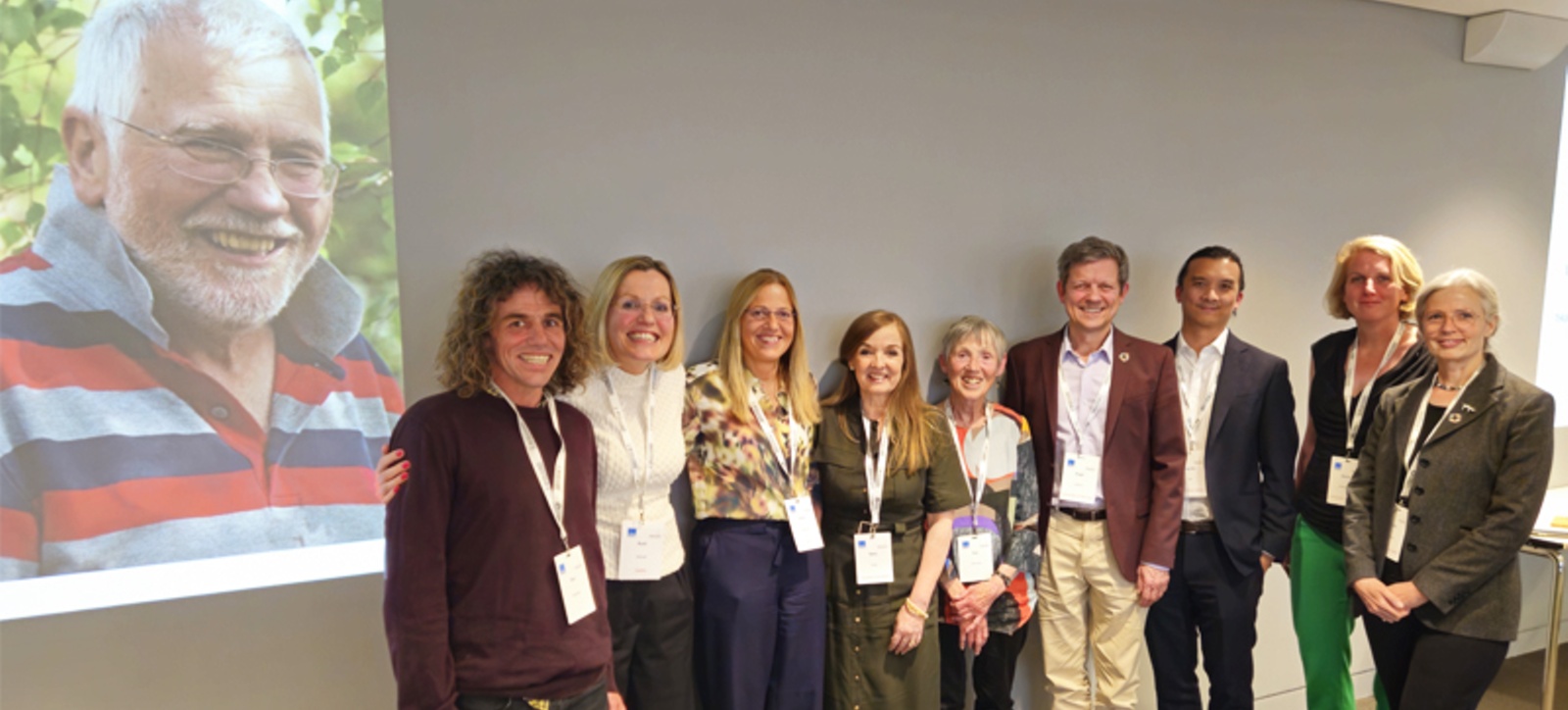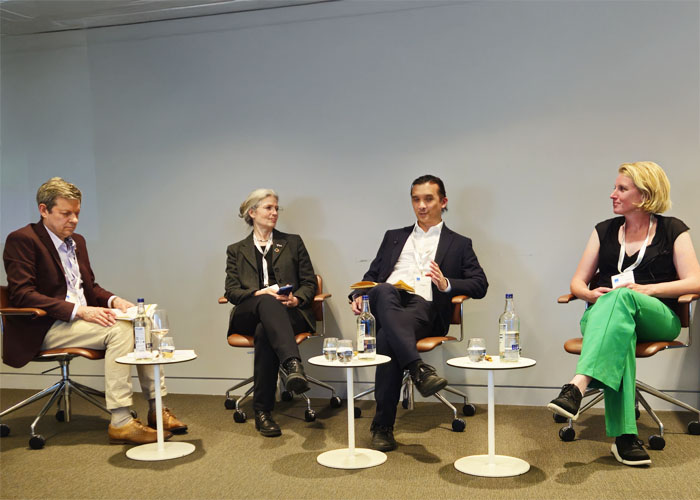
Proud day: Next to a picture of Robin Wensley stand his family, friends and academics at the inaugural lecture in the former WBS Dean's name
At the inaugural Robin Wensley Memorial Lecture Alona Armstrong revealed that vast solar farms could become havens for beleaguered native species in the UK and worldwide.
Held at WBS London at The Shard, the annual lecture has been created by the British Academy of Management (BAM) to honour the memory and achievements of Professor Wensley, former Warwick Business School Dean, who passed away at the age of 77 in 2022.
After an opening speech from his daughter Helen, Katy Mason, President of BAM, paid tribute to Professor Wensley, who was Dean at WBS from 1989 to 1994 after joining the School in 1986 as Professor of Strategic Management and Marketing.
Professor Mason said: “Robin was a founding member of the British Academy of Management and a world leading scholar.
“He was also an absolute champion of interdisciplinary scholarship, working with practitioners and policymakers doing research that really mattered, way before we had an impact. So, we want these annual lectures to be around that interdisciplinary dialogue and for those people who are open minded and ambitious.”
Professor Armstrong, of Lancaster University, revealed how the emergence of vast solar farms, instead of being a blight on the country’s landscape, could help revive the UK’s diminishing wildlife.
“We’re facing an ecological crisis and biodiversity loss, yet biodiversity underpins our very existence, with 50 per cent of the UK’s GDP reliant on biodiversity,” she said.
“And yet one in six species in Great Britain face extinction, making us one of the most nature-depleted countries in the world.”

While the Intergovernmental Panel on Climate Change (IPCC) rightly demands countries decarbonise their energy supply, with 75 per cent of global greenhouse gas emissions stemming from energy, the vast land footprint of renewables presents a fresh challenge.
Professor Armstrong pointed out that renewable energy sources require “two orders of magnitude more land than conventional sources” and so may add to the country’s biodiversity woes.
Yet, her decade-long studies on solar farms have uncovered compelling reasons for optimism. These sites, she explained, are “quite secure,” offering undisturbed environments for nature to recover.
“Soil temperature was at times up to 5C cooler,” said Professor Armstrong. “This creates microclimatic niches for biodiversity. We found this cooling effect extended up to a kilometre away beyond the farm’s boundary.”
She argued solar farms can also be actively managed for nature. Her research demonstrates that by cultivating “species-rich meadows” within the sites, a significant boost in pollinator populations can be achieved. Even simply creating “meadow margins around the perimeter” yields substantial positive outcomes.
And the solar farm industry is showing a remarkable willingness to embrace these environmental opportunities. Professor Armstrong recounted how developers approached her team, leading to the creation of practical, evidence-based tools for enhancing biodiversity on site.
This industry engagement has seen the number of solar farms participating in biodiversity monitoring schemes grow from 37 to 120 in just three years, covering roughly 10 per cent of the UK’s total solar capacity.
Professor Armstrong added: “Solar is being rolled out really rapidly. So how can we get the knowledge we have and really embed it and change practice and policy ideally?"
In the panel discussion that followed Hugh Wilson, Professor of Marketing at WBS, argued that though some business activities are clearly part of the sustainability problem, in other respects business is leading the way in sustainability efforts to avert ecological collapse and it is governments who need to catch up.
“The name of the game is system change,” said Professor Wilson. “It will take wholesale transformation of systems such as food, housing and transport as well as energy to save the planet. Professor Armstrong’s success with solar farms shows what can be done when multiple actors work together.
“We know that businesses need a sustainability governance board that’s cross-functional and that also reaches out to other actors within the business ecosystem, from NGOs to universities. And that’s what we teach on our MBA programmes. Government actually needs to do the same thing, and ours in the UK hasn’t done it yet. One department worries about carbon, another about biodiversity, and so on.
“Chris Skidmore, Conservative MP, who was Minister for Energy, chaired a report that said the Treasury needs to take carbon into account in every decision it signs off - it needs to be in the Treasury’s ‘Green Book’.
“Exactly the same applies to land use and biodiversity, where the planet is in an equally critical state. We need to get the right targets into the balanced scorecard for the whole organisation, and governments need to do the same – it is the only way we can change the system. Meanwhile, though, businesses have a critical role in generating the systemic innovations that policymakers can then scale up.”
Further reading:
WBS academic's sustainability game wins Financial Times award
WBS launches Sustainability Professional Network at MBA Alumni Conference
Beyond the balance sheet: Accounting for sustainability
Involving marginalised communities in sustainability initiatives
Discover our Warwick Business School Change Makers.




 X
X Facebook
Facebook LinkedIn
LinkedIn YouTube
YouTube Instagram
Instagram Tiktok
Tiktok